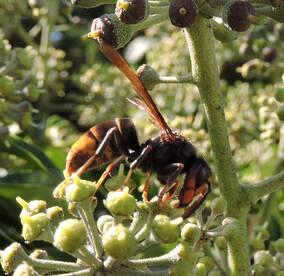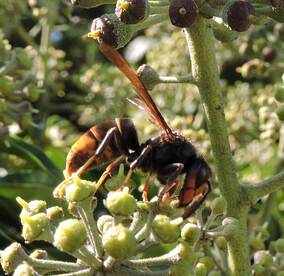|
Somerset Beekeepers’ Association (SBKA) is calling on the public to help fight a major threat to honey bees and other pollinators - Asian hornets.
To date around 51 nests have been discovered in the UK so far this year, more than three times the number found in the last six years combined. Local beekeepers are concerned that these invasive predators will reach Somerset. There have been a number of unconfirmed sightings in the county. Lynne Ingram, SBKA’s Asian hornet team coordinator, said: “Asian hornets are wreaking havoc in Europe and, if they get established in the UK, our honey bees and many other insects will be decimated here, too.” Asian hornets (Vespa velutina) look like a large black wasp with yellow legs, an orange face, blackish brown body with a broad orangey yellow stripe towards the end of the abdomen. They are slightly smaller than native European hornets. Anyone who suspects they have seen an Asian hornet should report it immediately using the phone app ‘Asian Hornet Watch’ or the online reporting form: https://risc.brc.ac.uk/alert.php?species=asian_hornet Asian hornets are a non-native, invasive species and must be reported. Many nests have been found in patches of brambles and in hedgerows and there are fears that foragers enjoying the bumper blackberry crop and gardeners could inadvertently disturb a nest. Lynne added: “Foragers and gardeners should check hedges carefully to avoid disturbing an Asian hornet nest. Normally they don’t attack, but if you are near a nest, or disturb it, they can become extremely aggressive and dangerous.” A single nest can contain up to 6,000 workers and 350 queens. “We must act to stop them getting established in this country,” added Lynne. “Now is a key time to discover and destroy any nests before they produce new queens, which will mate, go into hibernation, and produce new nests next year” At this time of the year Asian hornets can be spotted on flowering ivy, fallen fruit and catching honey bees outside their hives. Asian hornets hover about a foot away from the entrance to a beehive, before charging bees and forcing them to the ground. They then paralyse them and carry the bees away. Just one Asian hornet can hunt down and eat 50 honey bees a day and their habit of hawking (hovering) outside the hive stops the bees from collecting nectar and pollen to feed themselves. “We need the public to help protect honey bees and other pollinators from this voracious predator.” Hornet sightings are filtered by the National Bee Unit (NBU), part of Defra, and teams of bee inspectors deployed to track hornets back to their nests which are then destroyed. Beekeepers across the country are mobilising as part of elite teams trained to provide emergency support to the NBU’s hornet hunters. A single Asian hornet queen arrived by accident in France from China in 2004 and has spread rapidly across France and into many other European countries. Ends Photos: About Asian hornets (Vespa velutina):
About Somerset Beekeepers’ Association (SBKA):
e to edit. Comments are closed.
|
Archives
September 2023
Categories
All
|
Somerset Beekeepers Association Charity © 2021 Registered CIO Charity 1206483
Affiliated to the British Beekeepers Association
Click here to view our Privacy Policy
Affiliated to the British Beekeepers Association
Click here to view our Privacy Policy


 RSS Feed
RSS Feed
